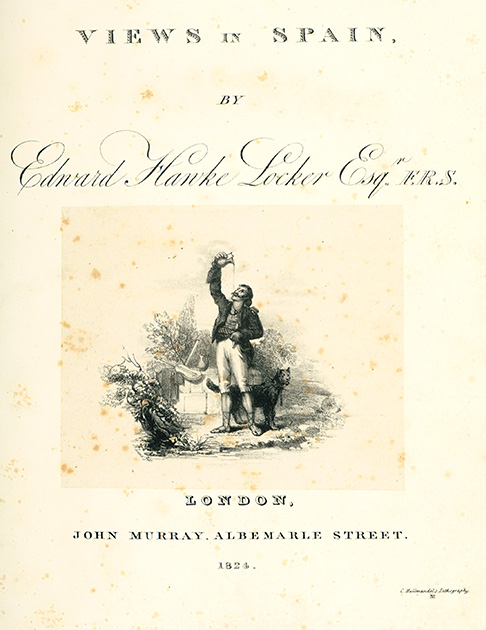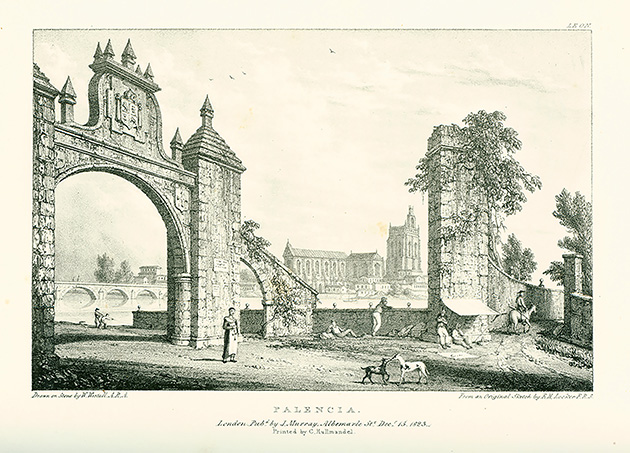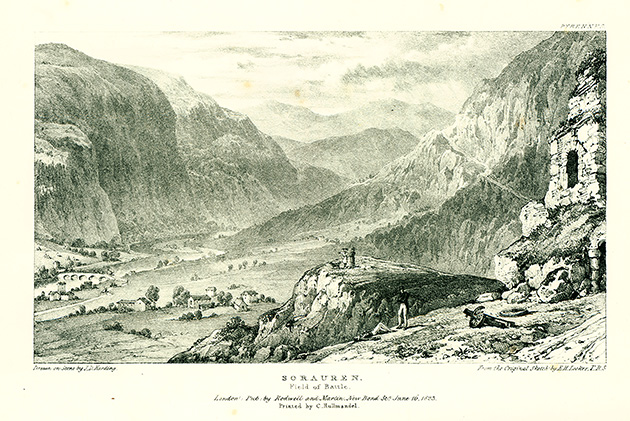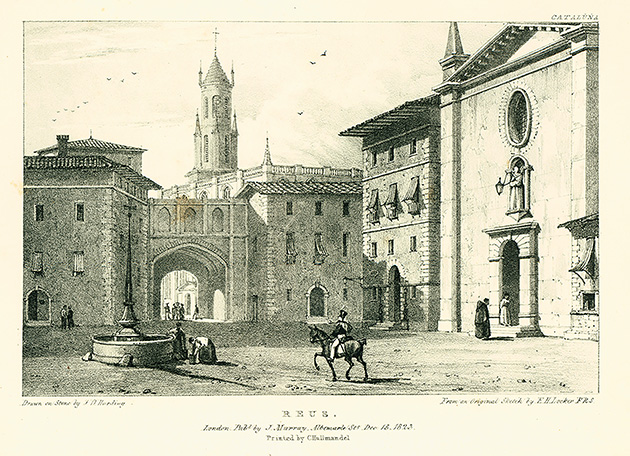By: Savannah Gulick, Archives & Rare Books Library Student Assistant
 One of the collecting areas of the Rare Books Collection in the Archives & Rare Books Library is early travel and exploration. Though this area of the holdings ranges from the 16th century to the 20th, many of the travel accounts are illustrated volumes from the 19th century. During the Peninsular War (1808-1813) that was fought between Napoleon and Spain against Great Britain and Portugal for the control of the Iberian Peninsula, the English watercolorist and civil secretary of 1st Viscount Exmouth Edward Pellew, Edward Hawke Locker, recorded his tour of Spain through watercolors and etchings. Following his appointment as civil commissioner of Greenwich Hospital, Locker proceeded to publish his account in Views of Spain (1824).
One of the collecting areas of the Rare Books Collection in the Archives & Rare Books Library is early travel and exploration. Though this area of the holdings ranges from the 16th century to the 20th, many of the travel accounts are illustrated volumes from the 19th century. During the Peninsular War (1808-1813) that was fought between Napoleon and Spain against Great Britain and Portugal for the control of the Iberian Peninsula, the English watercolorist and civil secretary of 1st Viscount Exmouth Edward Pellew, Edward Hawke Locker, recorded his tour of Spain through watercolors and etchings. Following his appointment as civil commissioner of Greenwich Hospital, Locker proceeded to publish his account in Views of Spain (1824).
Locker, the youngest son of Captain William Locker, was born on October 9, 1777 in Kent. He entered the military following an education at Eton in 1795 at the naval pay office. From that point forward, he would secure a series of promotions until his retirement as civil commissioner  in 1844 when he suffered a mental breakdown. Remembered as a man of varied talents, Locker was a skilled artist and a smooth conversationalist, and, was a fellow of the Royal Society. His pictorial tour of Spain is just one of his many illustrated works documenting his travels abroad. The British Empire and travel literature in the 19th century often go hand in hand as many of Britain’s skilled officers were sent on foreign tours and often documented their exotic travels (see account of India: https://libapps.libraries.uc.edu/liblog/2018/05/art-and-empire-in-nineteenth-century-india/).
in 1844 when he suffered a mental breakdown. Remembered as a man of varied talents, Locker was a skilled artist and a smooth conversationalist, and, was a fellow of the Royal Society. His pictorial tour of Spain is just one of his many illustrated works documenting his travels abroad. The British Empire and travel literature in the 19th century often go hand in hand as many of Britain’s skilled officers were sent on foreign tours and often documented their exotic travels (see account of India: https://libapps.libraries.uc.edu/liblog/2018/05/art-and-empire-in-nineteenth-century-india/).
Locker’s Spanish account further illustrates the intricateness of this relationship to  the country as his etchings alternate between depictions of battlefields and various city and landscape views. At the same time as his publication of Views in Spain, Locker succeeded in bringing his father’s plans of a Naval Gallery to fruition in the Greenwich Hospital’s Painted Hall. As a result, the gallery received 31 paintings as a gift from George IV. This gallery later became the National Maritime Museum.
the country as his etchings alternate between depictions of battlefields and various city and landscape views. At the same time as his publication of Views in Spain, Locker succeeded in bringing his father’s plans of a Naval Gallery to fruition in the Greenwich Hospital’s Painted Hall. As a result, the gallery received 31 paintings as a gift from George IV. This gallery later became the National Maritime Museum.
Following his mental breakdown, Locker died five years later in Iver on October 16, 1849.
Locker, Edward Hawke. Views in Spain. London, J. Murray, 1824. Call No. RB DP38.L63

